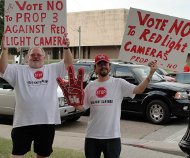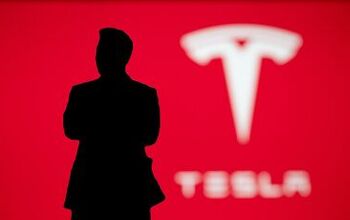Decision Overturning Houston Anti-Camera Referendum Appealed
The battle over the Houston, Texas red light camera program returned to the legal spotlight Monday. A majority of voters agreed with Francis M. Kubosh and Randall Kubosh in November that the automated ticketing machines should be removed, but a federal judge intervened earlier this month and overturned the election ( view ruling). The Kuboshes filed a reply brief with the US Court of Appeals for the Fifth Circuit Monday seeking to restore the result of the public vote.
“The issues are important to the electorate of the nation’s fourth largest city, Houston, where a 52.8 percent majority voted ‘No’ to a ballot proposition hand-crafted by the city attorney, approved by the mayor, and ratified by all but one member of the city council,” wrote David Allen Furlow, attorney for the Kuboshes. “The outcome of this case will affect the complex web of relationships among municipal governments, their citizens, and private contractors throughout Texas and the nation.”
The Kuboshes argue that US District Judge Lynn N. Hughes erred as a matter of law by agreeing to the pretense of having the city of Houston, which supports cameras, sue American Traffic Solutions (ATS), which operates cameras, as if there were an actual dispute between the two. Hughes, who has served on the bench for 25 years with Judge David Hittner, agreed within 48 hours to hear a request for a restraining order to keep the ATS cameras up filed on behalf of Judge Hittner’s son, ATS General Counsel George Hittner. Hughes set a hearing on the matter for the day after Thanksgiving in a lightning move designed to exclude the initiative sponsors, who were never notified. During the proceedings, Hughes did not hide his true feelings.
“So, the essence of the popular revolt was people in Houston want to run red lights,” Judge Hughes said on November 26, according to the record. “I mean, the highway department has cameras up and down the freeways and on some side streets.”
Hughes accordingly denied a motion by the Kuboshes requesting to intervene in the case, the order which the Kuboshes now appeal. Hughes only allowed the Kuboshes to file amicus briefs in the case, denying them the right to object to evidence and make arguments and motions without the leave of the court. Under Texas law, courts must permit the intervention of a qualified voter to defend a measure election in an election contest.
“Here, the city has lost a case it purports, falsely, to ‘zealously defend,’ enabling it to continue pocketing $10 million in annual red light camera revenues its mayor does not want to lose,” Furlow wrote. “Because the city waived the statutory and constitutional defenses appellants preserved, no one but appellants can defend the Proposition 3 election they petitioned for, organized, funded with $200,000 of their family’s money, and won at the polls. Only appellants can protect their and their fellow citizens’ constitutional and statutory right to reform city government through charter amendment elections.”
ATS and Houston’s city attorney are now arguing together that the case that invalidated the election was merely a contract dispute to which the Kuboshes were not a party.
[Courtesy: Thenewspaper.com]
More by The Newspaper
Latest Car Reviews
Read moreLatest Product Reviews
Read moreRecent Comments
- Kjhkjlhkjhkljh kljhjkhjklhkjh A prelude is a bad idea. There is already Acura with all the weird sport trims. This will not make back it's R&D money.
- Analoggrotto I don't see a red car here, how blazing stupid are you people?
- Redapple2 Love the wheels
- Redapple2 Good luck to them. They used to make great cars. 510. 240Z, Sentra SE-R. Maxima. Frontier.
- Joe65688619 Under Ghosn they went through the same short-term bottom-line thinking that GM did in the 80s/90s, and they have not recovered say, to their heyday in the 50s and 60s in terms of market share and innovation. Poor design decisions (a CVT in their front-wheel drive "4-Door Sports Car", model overlap in a poorly performing segment (they never needed the Altima AND the Maxima...what they needed was one vehicle with different drivetrain, including hybrid, to compete with the Accord/Camry, and decontenting their vehicles: My 2012 QX56 (I know, not a Nissan, but the same holds for the Armada) had power rear windows in the cargo area that could vent, a glass hatch on the back door that could be opened separate from the whole liftgate (in such a tall vehicle, kinda essential if you have it in a garage and want to load the trunk without having to open the garage door to make room for the lift gate), a nice driver's side folding armrest, and a few other quality-of-life details absent from my 2018 QX80. In a competitive market this attention to detai is can be the differentiator that sell cars. Now they are caught in the middle of the market, competing more with Hyundai and Kia and selling discounted vehicles near the same price points, but losing money on them. They invested also invested a lot in niche platforms. The Leaf was one of the first full EVs, but never really evolved. They misjudged the market - luxury EVs are selling, small budget models not so much. Variable compression engines offering little in terms of real-world power or tech, let a lot of complexity that is leading to higher failure rates. Aside from the Z and GT-R (low volume models), not much forced induction (whether your a fan or not, look at what Honda did with the CR-V and Acura RDX - same chassis, slap a turbo on it, make it nicer inside, and now you can sell it as a semi-premium brand with higher markup). That said, I do believe they retain the technical and engineering capability to do far better. About time management realized they need to make smarter investments and understand their markets better.


































Comments
Join the conversation
I wonder what those court justices think when they sing, "O'er the land of the free, and the home of the brave"?